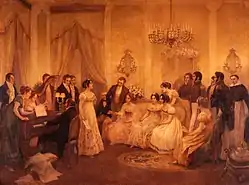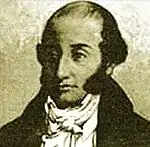Гімн Аргентини
Himno Nacional Argentino — державний гімн Аргентини.
| Himno Nacional Argentino | ||
|---|---|---|
| Íмно Насьйональ Архентіно | ||
 Гімн Аргентини грають уперше. Картина Педро Суберкасо | ||
| Країна |
| |
| Слова | Вісенте Лопес-і-Планес, 1812 | |
| Мелодія | Блас Парера, 1813 | |
| Затверджений | 11 травня 1813 | |
| Музичний приклад | ||
|
Інструментальна версія
| ||
|
| ||
Слова аргентинського національного гімну були написані Вісенте Лопесом-і-Планесом, музика — Бласом Парерою. Пісня була прийнята як національний гімн 11 травня 1813 року. 11 травня відзначається в Аргентині як День Гімну[1].
Історія


11 травня 1813 року Генеральні законодавчі збори Аргентини ухвалили як гімн текст пісні «Marcha Patriótica» («Патріотичний марш») на слова Вісенте Лопеса-і-Планеса, та доручили композитору Бласу Парері написати для нього музику.
Закінчена версія вперше була виконана 14 травня 1813 року в будинку аристократа Марікіта Санчес де Томпсона. Публічне виконання гімну відбулося 25 травня того же року в театрі Буенос-Айреса.
Спочатку гімн називався «Canción Patriótica Nacional» («Національна патріотична пісня»), а пізніше просто «Canción Patriótica» («Патріотична пісня»). 1847 року гімн було видано під назвою «Himno Nacional Argentino» («Аргентинський національний гімн»), цю назву він зберігає дотепер[2].
1860 року композитор Хуан Пабло Еснаола зробив нове аранжування музику гімну, зробивши її більш гармонічною та насиченою.
Початкова версія тексту гімну, названа Лопесом «Himno de Mayo» («Травневий гімн») була створена в період боротьби за незалежність Аргентини від Іспанії і була наповнена антиіспанською риторикою. З плином часу почуття ненависті до Іспанії згасло, тому Декретом президента Роки від 30 березня 1900 року була затверджена практика публічного виконання лише першої та останньої строфи гімну, які не містили антиіспанських висловлювань[3].
2 серпня 1924 року іншою резолюцією була закріплена музика Парери в обробці Еснаоли та заборонені музичні варіації на тему гімну.
Декретом 10.302 від 24 квітня 1944 року музика та слова були остаточно затверджені як державний гімн Аргентини.
Виконання
Виконання гімну Аргентини регулюється декретом 10302/1944[4].
Його виконання обов'язкове під час офіційних заходів. Присутнім належить встати і співати гімн. На телебаченні гімн повинен виконуватись перед завершенням мовлення. У дні національних свят обов'язкове виконання гімну опівдні та опівночі.
Через значну тривалість офіційної версії гімну Аргентини на Олімпійських іграх та перед футбольними матчами часто виконується лише інструментальний вступ тривалістю 1 хвилина 6 секунд.
Текст гімну
Сучасна версія (1924)
| Іспанський текст | Український переклад |
| Oíd, mortales, el grito sagrado: «¡Libertad, libertad, libertad!» Ya su trono dignísimo abrieron |
Слухайте, смертні, священний заклик: «Свобода, свобода, свобода!» Вже їхній найдостойніший престол відкрили |
| Estribillo Sean eternos los laureles |
Приспів Хай лаври будуть вічними, |
Початкова версія (1813)
| Іспанський текст | Англійський переклад |
| Oíd, mortales, el grito sagrado: Libertad, libertad, libertad. |
Mortals! Hear the sacred cry: Freedom, freedom, freedom! |
| Coro Sean eternos los laureles, |
Chorus May the laurels be eternal, |
| De los nuevos campeones los rostros Marte mismo parece animar |
From the new Champions their faces Mars himself seems to encourage |
| Pero sierras y muros se sienten retumbar con horrible fragor: |
Mountain ranges and walls are felt to resound with horrible din: |
| ¿No los véis sobre México y Quito arrojarse con saña tenaz |
Don't you see them over Mexico and Quito throwing themselves with tenacious viciousness? |
| A vosotros se atreve, argentinos, el orgullo del vil invasor; |
To you it dares, Argentinians, the pride of the vile invader; |
| El valiente argentino a las armas corre ardiendo con brío y valor, |
The valiant Argentinian to arms runs burning with determination and bravery, |
| San José, San Lorenzo, Suipacha, ambas Piedras, Salta y Tucumán, |
San José, San Lorenzo, Suipacha, both Piedras, Salta and Tucumán, |
| La victoria al guerrero argentino con sus alas brillante cubrió, |
Victory to the Argentine warrior covered with its brilliant wings, |
| Desde un polo hasta el otro resuena de la fama el sonoro clarín, |
From one pole to the other resounds the fame of the sonorous bugler, |
| Sean eternos los laureles que supimos conseguir. |
May the laurels be eternal, that we knew how to win. |
Див. також
Посилання
- Партитура аргентинського гімну
- Himno Nacional Argentino (інструментальна версія)
- Himno Nacional Argentino (MP3)
- Himno Nacional Argentino[недоступне посилання з липня 2019] (MP3)
- Himno Nacional Argentino (інструментальна версія) (MP3)
- Аргентинський гімн в форматі MP3
- Аргентинський гімн з англійськими субтитрами на сайті YouTube
Примітки
- Архівована копія. Архів оригіналу за 9 травня 2009. Процитовано 3 листопада 2010.
- Carlos Vega, El Himno Nacional Argentino (Buenos Aires: Eudeba, 1962), с. 88-89.
- Esteban Buch, O juremos con gloria morir: historia de una épica de estado (Buenos Aires: Editorial Sudamericana, 1994) с. 87-92.
- Архівована копія. Архів оригіналу за 3 березня 2016. Процитовано 3 листопада 2010.